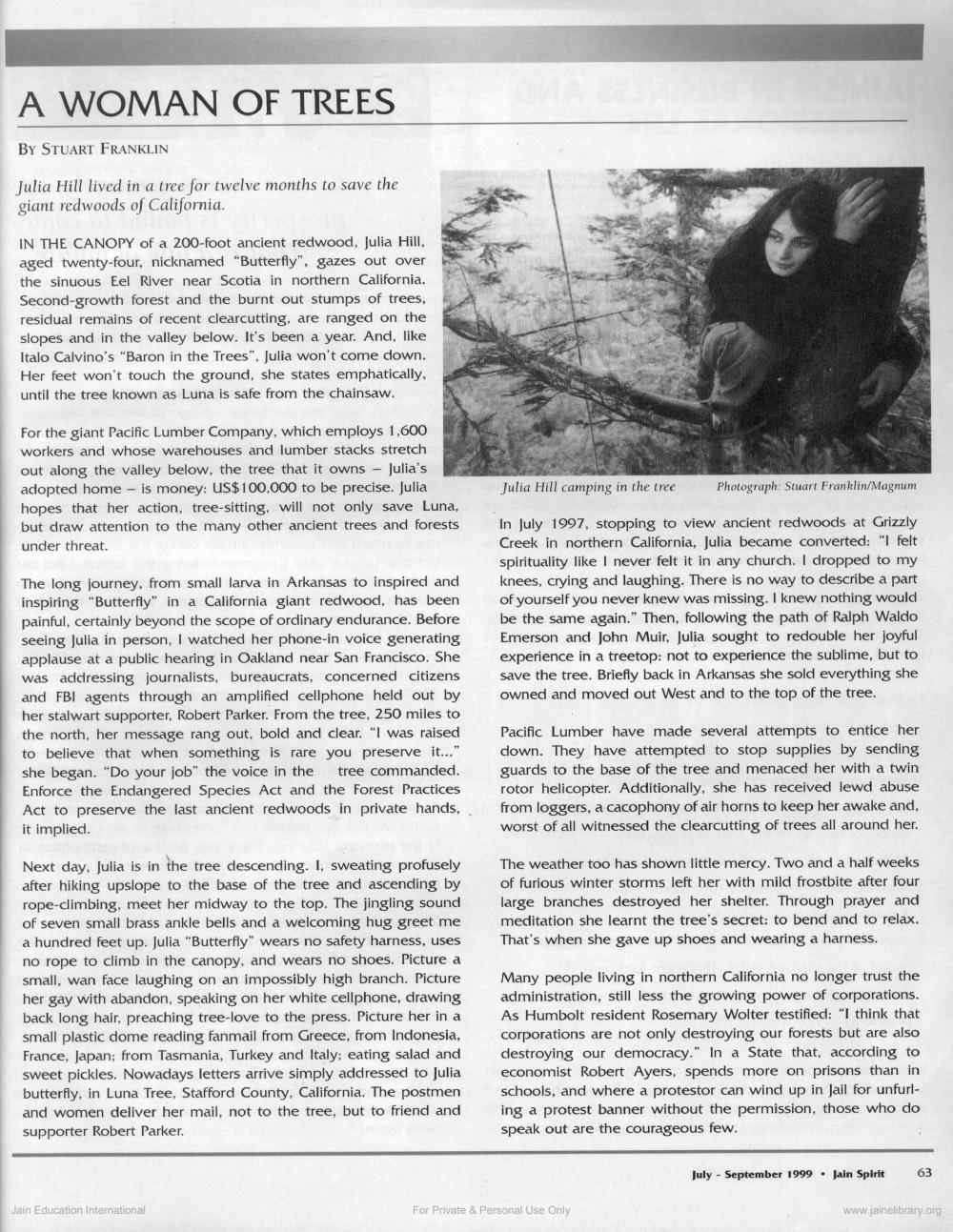________________
A WOMAN OF TREES
BY STUART FRANKLIN
Julia Hill lived in a tree for twelve months to save the giant redwoods of California.
IN THE CANOPY of a 200-foot ancient redwood, Julia Hill, aged twenty-four, nicknamed "Butterfly". gazes out over the sinuous Eel River near Scotia in northern California. Second-growth forest and the burnt out stumps of trees, residual remains of recent clearcutting, are ranged on the slopes and in the valley below. It's been a year. And, like Italo Calvino's "Baron in the Trees", Julia won't come down. Her feet won't touch the ground, she states emphatically, until the tree known as Luna is safe from the chainsaw.
For the giant Pacific Lumber Company, which employs 1,600 workers and whose warehouses and lumber stacks stretch out along the valley below, the tree that it owns - Julia's adopted home - is money: US$100,000 to be precise. Julia hopes that her action, tree-sitting, will not only save Luna, but draw attention to the many other ancient trees and forests under threat.
Julia Hill camping in the tree
Photograph: Stuart Franklin/Magnum
In July 1997, stopping to view ancient redwoods at Grizzly Creek in northern California, Julia became converted: "I felt spirituality like I never felt it in any church. I dropped to my knees, crying and laughing. There is no way to describe a part of yourself you never knew was missing. I knew nothing would be the same again." Then, following the path of Ralph Waldo Emerson and John Muir. Julia sought to redouble her joyful experience in a treetop: not to experience the sublime, but to save the tree. Briefly back in Arkansas she sold everything she owned and moved out West and to the top of the tree.
The long journey, from small larva in Arkansas to inspired and inspiring "Butterfly" in a California giant redwood, has been painful, certainly beyond the scope of ordinary endurance. Before seeing Julia in person, I watched her phone-in voice generating applause at a public hearing in Oakland near San Francisco. She was addressing journalists, bureaucrats, concerned citizens and FBI agents through an amplified cellphone held out by her stalwart supporter, Robert Parker. From the tree, 250 miles to the north, her message rang out, bold and clear. "I was raised to believe that when something is rare you preserve it..." she began. "Do your job" the voice in the tree commanded. Enforce the Endangered Species Act and the Forest Practices Act to preserve the last ancient redwoods in private hands, it implied.
Pacific Lumber have made several attempts to entice her down. They have attempted to stop supplies by sending guards to the base of the tree and menaced her with a twin rotor helicopter. Additionally, she has received lewd abuse from loggers, a cacophony of air horns to keep her awake and worst of all witnessed the clearcutting of trees all around her.
The weather too has shown little mercy. Two and a half weeks of furious winter storms left her with mild frostbite after four large branches destroyed her shelter. Through prayer and meditation she learnt the tree's secret: to bend and to relax. That's when she gave up shoes and wearing a harness.
Next day, Julia is in the tree descending. I sweating profusely after hiking upslope to the base of the tree and ascending by rope-climbing, meet her midway to the top. The jingling sound of seven small brass ankle bells and a welcoming hug greet me a hundred feet up. Julia "Butterfly" wears no safety harness, uses no rope to climb in the canopy, and wears no shoes. Picture a small, wan face laughing on an impossibly high branch. Picture her gay with abandon, speaking on her white cellphone, drawing back long hair, preaching tree-love to the press. Picture her in a small plastic dome reading fanmail from Greece, from Indonesia, France, Japan; from Tasmania, Turkey and Italy; eating salad and sweet pickles. Nowadays letters arrive simply addressed to Julia butterfly, in Luna Tree, Stafford County, California. The postmen and women deliver her mail, not to the tree, but to friend and supporter Robert Parker.
Many people living in northern California no longer trust the administration, still less the growing power of corporations. As Humbolt resident Rosemary Wolter testified: "I think that corporations are not only destroying our forests but are also destroying our democracy." In a State that, according to economist Robert Ayers, spends more on prisons than in schools, and where a protestor can wind up in Jail for unfurling a protest banner without the permission, those who do speak out are the courageous few.
July - September 1999 . Jain Spirit
63
Jain Education Intemational
For Private & Personal Use Only
www.jainelibrary.org




